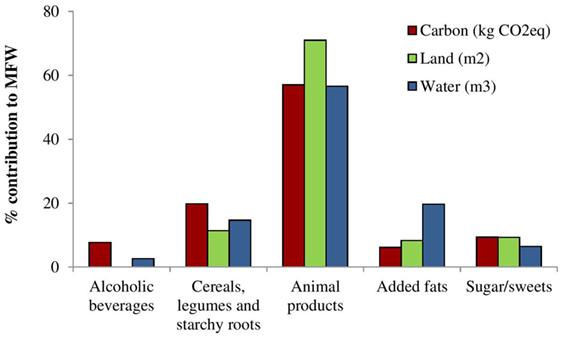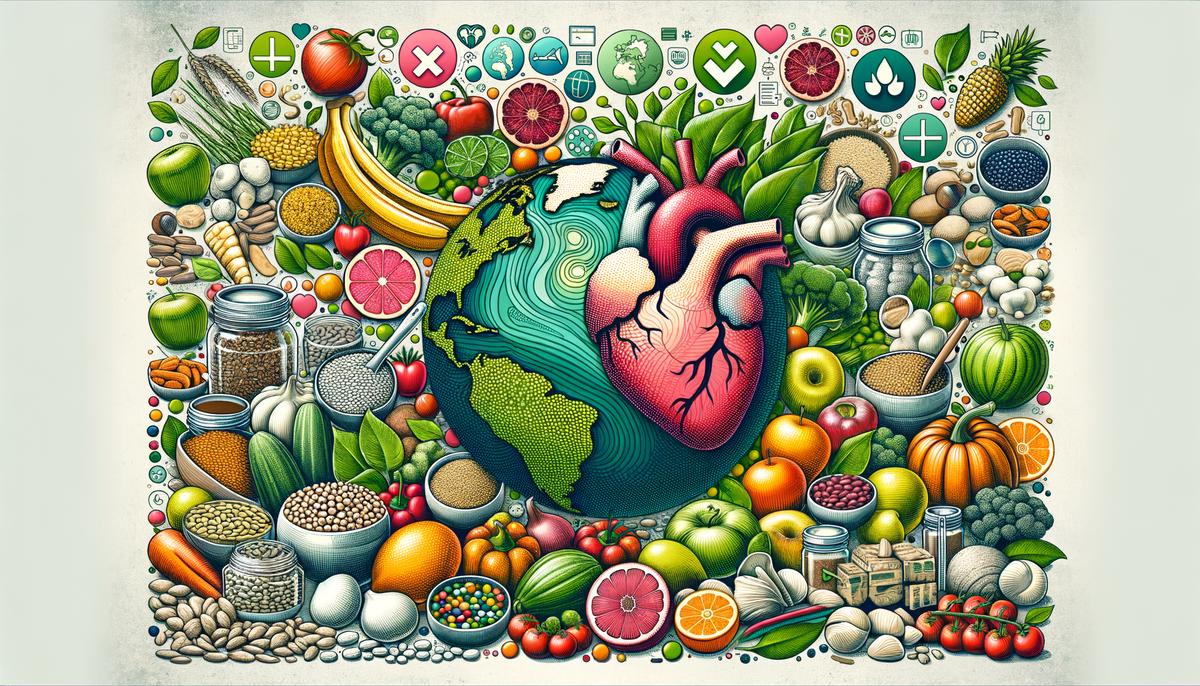Health Impacts of Plant-Based Diets
The term "plant-based diet" is widely perceived as a ticket to good health, but not all plant-based diets have the same outcomes when it comes to controlling chronic disease risks. A distinction emerges between what constitutes a healthy and an unhealthy plant-based diet.
Diets rich in whole grains, fruits, vegetables, nuts, legumes, and healthy oils like those from vegetables, are often associated with lower incidences of chronic diseases such as cardiovascular issues. On the flip side, plant-based diets high in less nutritious options—like refined grains, sugary drinks, and desserts—present a different story, increasing the risks of these health ailments.
Individuals gravitating towards a healthier spectrum of the plant-based menu experience notable benefits. A higher intake of leafy greens and fiber-rich foods is associated with reducing harmful cholesterol levels and improving heart health by curbing blood pressure and inflammation.1 The nutrients abundant in wholesome plant-based foods—notably antioxidants and fibers—play an instrumental role. These reduce oxidative stress and improve vascular function, essential factors in the battle against heart diseases.
However, it is the less healthy plant-based diets that carry a hidden risk despite their plant origin. Regular consumption of foods such as white bread, pastries, and high-sugar beverages can contribute to the body's inflammatory processes, exacerbating chronic conditions such as type 2 diabetes and obesity. These diets often rely heavily on crops like potatoes, which might seem benign at first glance but contribute to unhealthy glycemic loads when consumed in large quantities without the balance of fibers or protein.
A crucial factor in the impact of plant-based diets is their nutritional composition. Turning to an unhealthy plant-based diet high in processed foods stifles the supposed health benefits, leading to higher disease risk territories. This concept embodies the idea that merely choosing plant-based options is not a guarantee for health—it calls for a nuanced selection focusing on food quality.
Accompanying issues like excess calorie intake, despite being sourced from plant-based foods, could still lead to weight gain—intersecting with pathways to chronic diseases such as cardiovascular disorders and type II diabetes. It drives home the point that moderation is critical, especially in diets perceived as inherently healthy. Reinforcing this view is the perennial susceptibility to various ailments originating from dietary excesses, irrespective of their primary composition.
Wrapping one's head around these nutrition intricacies delivers a good pulse on tailoring diets that are substantively plant-based yet holistically designed towards sustainable health outcomes over a lifespan. Transitioning from meats and overly processed foods to grains, beans, legumes, and vegetables demands not just a routine adjustment but also a deep dive into what constitutes one's food plate on a day-to-day basis. Setting sights on the broader spectrum of diet-induced health impacts frames a diet correctly as a continuing commitment to body nourishment and disease prevention.
Environmental Footprint of Dietary Choices
Our food choices extend beyond personal health, significantly affecting the planet's ecological balance. The environmental footprint of our diet—the greenhouse gas emissions, land use, and water usage—is profoundly shaped by our preference for or abstinence from animal products.
Studies consistently highlight the heavier environmental toll exacted by diets rich in meat and dairy. Animal agriculture is a primary driver of methane emissions, a powerful greenhouse gas that is 25 times more potent than carbon dioxide over a 100-year period.2 Livestock contributes around 14.5% of all anthropogenic greenhouse gas emissions, with cattle raising alone accounting for about 65% of the livestock sector's emissions.3
In contrast, plant-based diets are generally less resource-intensive. A significant shift to such diets could curb global greenhouse gas emissions considerably due to lower methane production and reduced deforestation for pastureland. The land efficiency of plant-based diets is notably higher—using land to grow crops directly for human consumption rather than as fodder for animals markedly increases the number of people that can be fed per hectare.
Water usage also sketches a stark contrast. Animal products, particularly dairy and meat, require substantial amounts of water, primarily for growing feed crops. A global pivot towards more plant-based diets could result in substantial reductions in water use, alleviating pressure on this precious resource which is already under severe stress in many parts of the world.
The environmental cost of diet choices extends to biodiversity. Intensive livestock farming and the need for expanding agricultural land often lead to habitat destruction, a principal cause of biodiversity loss. Shifting to plant-based diets can help mitigate this impact. The decrease in land required for food production frees up space for natural habitats to regenerate, fostering biodiversity.
One must recognize that not all plant-based foods are equal in their environmental footprint—almonds and avocados, for example, are known for their high water usage. This complexity necessitates a nuanced understanding and approach to promoting plant-based diets. They should not only be healthy but also composed of foods with lesser water and land footprints.
It is imperative to pair the advocacy for plant-based diets with education on choosing environmentally beneficial plant-based options. This can guide individuals in composing meals that are not just healthy but are also rooted in the principles of ecological sustainability. Aligning dietary practices with environmental sustainability is not an insular approach but rather a broad strategy entwined with global ecological health and ethical responsibility.
Embracing comprehensive plant-rich diets showcases a compelling synergy between human health and planetary wellbeing, reflecting our intrinsic interdependency. As we cultivate dietary habits conducive to both personal and planetary health, the outline of a sustainable dietary framework becomes clearer: reducing consumption of animal-based foods not only helps in managing chronic diseases but crucially moderates our ecological footprint, steering us towards a viable, flourishing future.

Economic and Policy Considerations
Governments and policymakers globally are progressively experimenting with various fiscal policies to tackle the environmental issues stemming from existing dietary patterns. The implementation of taxes on high-emission foods, similar to the levies imposed on sugar-laden beverages and tobacco, exemplifies one proactive approach. Such measures aim to reflect the true environmental cost of food production on publicly priced commodities, nudging consumers towards more sustainable options. For instance, Denmark and New Zealand have explored the idea of a meat tax due to the substantial methane emissions contributed by livestock, a step aimed at mitigating climate change through dietary change.4
Outside of taxation, subsidies for environmentally friendly farming practices and the reduction of subsidies for animal agriculture can also redirect consumption patterns. These shifts in policy and financial support can effectively lower the cost of plant-based foods, making them more accessible and appealing to the public. Policies that economically favor sustainable crop farming over livestock farming could catalyze a broad dietary shift, aligning public health interests with environmental sustainability.
Public procurement policies play a critical role. By mandating plant-rich meals in schools, hospitals, and government institutions, policymakers can significantly amplify the impact of their dietary guidelines, providing early exposure to nutritious, low-impact diets while directly reducing the purchase of high-emission foods.
Such economic and policy-driven initiatives also necessitate constituents' understanding and cooperation. Transparent communication about the reasons behind these measures—especially their direct benefits in combating climate change and promoting health—is essential. Community engagement and educational campaigns can elucidate how such policies dovetail with broader ecological and public health goals, fostering a shared commitment to change.
These fiscal and informational approaches serve as keystones in the architecture of sustainable food systems. They highlight that economic instruments, paired with compelling policy frameworks and public cooperation, can underwrite significant strides towards ensuring ecological resilience and well-being. The goal is to establish a symbiotic relationship between a thriving economy and a thriving planet, proving that through well-judged policy shifts, we are capable of prompting substantial positive change in both public health and environmental conservation.

Global Food Production and Sustainability
The challenges of transforming global food production systems to achieve sustainability targets are both complex and critical. With the overarching goal of minimizing ecological degradation while ensuring food security for a growing global population, the shift towards a more plant-based dietary pattern emerges as a pivotal strategy.
Currently, the global food production landscape is overwhelmingly slanted towards high-meat, high-input agriculture systems, primarily configured to support a dietary preference for animal protein. This alignment has precipitated multifaceted environmental burdens—ranging from deforestation and loss of biodiversity to high greenhouse gas emissions and excessive water use. Livestock farming not only consumes a substantial portion of the world's arable land, due to its need for extensive pasture and feed crops, but also contributes significantly to global methane output.
Facing these unsustainable realities, reconfiguring food production becomes a necessity. Stewarding a transition toward plant-centric diets requires not only adjusting agricultural practices and supply chains but also reimagining consumption patterns across societies, cultures, and economies—a monumental task.
A notable impediment to sustainable transformation is the mismatch between current agricultural practices and the optimal use of resources. Modern agriculture's heavy reliance on water-intensive crops for animal feed and the inefficient conversion of these crops into animal protein highlight systemic inefficiencies. The reorientation of cropping patterns—a move towards growing human-edible crops rather than livestock feed—could dramatically enhance caloric efficiency and nutritional output per hectare.
Expanding sustainable agriculture practices, such as agroecology and permaculture, presents opportunities for enhancing biodiversity and reducing environmental pollutants. These practices optimize ecosystem services—including water regulation, pest control, and nutrient cycling—that commercial agricultural methods often undermine through pesticide dependence and soil depletion.
Achieving widespread adoption of these environmentally-aligned practices demands broad stakeholder engagement. This includes discussions with farmers, who must be assured of economic stability and supported through training and incentives to adopt more sustainable practices. Consumer buy-in is equally crucial, necessitating greater awareness of the environmental impacts of dietary choices and enhancing accessibility and attractiveness of plant-based options.
Another formidable challenge underscores market configurations and trade policies. Food production and consumption have global implications, entwined with complex trade networks influencing what is grown and eaten where. Decoupling food security from intensive animal farming requires rethinking these pathways to incentivize crops that align more closely with ecological sustainability goals.
Through these layers of complexity, the vision of transforming global food production toward sustainability crystallizes under one umbrella: diet change. The conversation, buoyed by scientific insight and ecological imperatives, pivots on endorsing plant-centric diets not as mere alternatives but as foundational elements in a sustainable food future. Such shifts, while promising significant strides towards environmental wellness, must be approached with thoughtful policies, international cooperation, and community participation.
Moving towards this horizon requires more than tweaks to existing frameworks; it demands a re-envisioning of the ties between human consumption and planetary health. Each bite of food taken can be seen as a stand for or against sustainable living—an ethical dimension weaving through the narrative of global food production transformation. As stakeholders from farmers to policy-makers, and consumers to activists embrace their roles in this emerging food landscape, the brighter prospects of sustainability come into clearer focus—an interconnected global village sowing seeds not just for the present, but for generations to come.
Cultural and Social Factors
Shifting diets globally invokes complicated socio-cultural dynamics that extend deep into the roots of every society. Cultural preferences and traditions often dictate dietary choices, solidifying certain food patterns across generations. Meat, for example, is more than a dietary component; it's a cultural symbol for many, signifying prosperity and social status. As ingrained patterns, these pose substantial barriers when suggesting shifts toward plant-based diets. Social norms, buttressed by longstanding traditions, can make such transitions seem daunting.
The role of social norms in dietary choices can't be overstressed, serving both as a guardian of conventional dietary patterns and a barrier to healthier, sustainable alternatives. This influence spans from family dining tables to social gatherings, where deviations from meat-centric menus are often viewed with skepticism or resistance. Here, the temptation to conform can eclipse environmental considerations or even personal health benefits associated with plant-based diets.
A critical aspect manifesting concurrently with this cultural adherence is the proliferation of misinformation, which plays a formidable role in shaping public perceptions and skepticism towards plant-based diets. Myths—such as plant-based diets do not provide sufficient protein, or that they are invariably more expensive—further discourage shifts from established eating habits. These misconceptions are cemented via various communication channels, complicating efforts aimed
